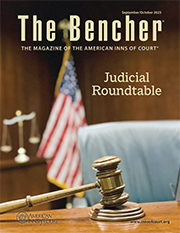Discovery Implications for Video Conferencing
The Bencher | September/October 2023
By Ryan P. Newell, Esquire

 Having largely returned to a pre-pandemic lifestyle, many of us may be looking to leave behind certain vestiges of the past few years, such as video conferences.
Having largely returned to a pre-pandemic lifestyle, many of us may be looking to leave behind certain vestiges of the past few years, such as video conferences.
Of course, video conferencing has persisted despite a transition back to the office. With the exorbitant use during the pandemic and the enduring use thereafter, attorneys must be mindful of the litigation implications for their clients. Fortunately, our laws and practitioners have proven to be facile in adopting with the times, as we experienced during the first wave of electronic discovery years ago. The advent of e-discovery initially brought confusion and uncertainty, but the bench and bar quickly adapted. Now, having evolved how we conduct business because of the pandemic, we may be at the outset of yet another revolution with discovery of video conferencing data.
Video Conferencing Data
As a starting point, it is important to understand what type of data is created using video conference platforms. First, and perhaps most obvious, such platforms often give users the opportunity to record the video. Second, even when video is not used, parties typically can record the audio. The third most common type of data created is text, through a messaging or chat function within the application.
Discoverability of Video Conferencing Data
Lest there be any doubt that such “documents” are discoverable, state and federal courts across the nation have successfully evolved with advances in discovery. For example, rules governing requests for production now expressly include electronically stored information within the scope of discoverable information. Even certain rules of professional conduct, such as Rule 1.1 of the Delaware Lawyers’ Rules for Professional Conduct, mandate that “[t]o maintain the requisite knowledge and skill, a lawyer should keep abreast of changes in the law and its practice, including the benefits and risks associated with relevant technology…”
The Duty to Preserve
Because we cannot hide our head in the proverbial sand (or turn off the metaphorical video camera to hide behind a black box), when does an obligation to preserve such data arise? As with other forms of relevant discovery, the obligation to preserve arises when a party reasonably anticipates litigation. Despite this well-accepted standard, the injection of video conferencing into our course of business raises some interesting scenarios.
Take, for example, the termination of an employee. Often, a company might break the news to the employee in an in-person meeting. A termination conducted via video conference, however, raises some new considerations. If the employer can foresee a potential suit for wrongful termination, it arguably now has a duty to preserve that meeting’s video or audio. Indeed, it may want to. Or it may elect to have the meeting in-person even if less convenient.
Alternatively, consider a board meeting to discuss a merger for a publicly traded company. Given the high rate of litigation resulting from such transactions, does a board have an obligation to preserve the recordings or messages from that meeting?
For estate planning practitioners, the pandemic also saw the rise of remote will signings. Should there likely be a dispute about testamentary capacity, is there now a common law duty to preserve a video of the signing?
Divorce attorneys saw a rise in cases throughout the pandemic. In this arena, video messaging applications on mobile devices are frequently used. Just as in the other practice areas above, these new means of communicating are also creating new forms of discovery.
Be Prepared
So what to do? As with any form of discoverable information, it starts with a plan. Just as clients should be deliberate when they use certain mediums of communicating, that calculus must now extend to video conferencing. Moving forward, thought should be given to whether a meeting should be conducted remotely or in person and, if the former, what can be said in chat. Beyond that, clients should consider how long they retain such records in the ordinary course (or even whether they should cede control to the video conference provider to store the data).
Discovery of video conferencing data will likely be governed by the same rules and common law that have successfully evolved from paper to electronic data. Yes, we are in the midst of a Zoom revolution, but per Peter Townshend, you won’t get fooled if you remember the new boss is the same as the old boss.
Ryan P. Newell, Esquire, is a partner at Young Conaway Stargatt & Taylor, LLP in Wilmington, Delaware. He is president of the Richard K. Herrmann Technology American Inn of Court.
A longer version of this article was published in the September 2022 issue of The Journal of the Delaware State Bar Association. Reprinted with permission.